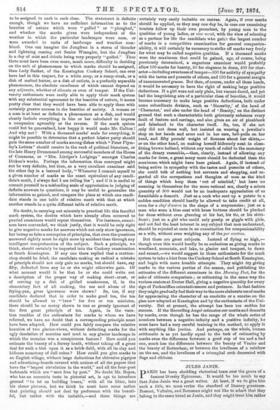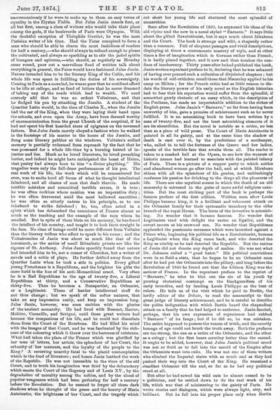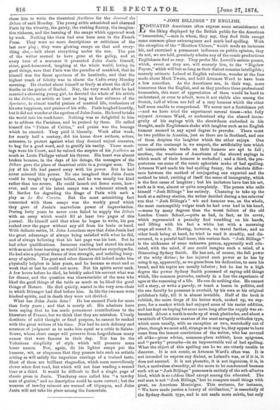JULES JANIN.
PARIS has been shedding rhetorical tears over the grave of a famous literary Epicurean. It would be too much to say that Jules Janin was a great writer. At least, if we do give him such a title, we must revise the standard of literary greatness. Bossuet, Voltaire, and Rousseau might not like to admit that they belong to the same breed as Janin, and they might treat him rather
unceremoniously if he were to make up to them on easy terms of equality in the Elysian Fields. But Jules Janin stands first, or all but first, among a class of writers who would take their place among the gods, if the boulevards of Paris were Olympus. With the doubtful exception of Thdophile Gautier, he was the most Parisian writer of his time. Had the Fates conspired to form a man who should be able to charm the most fastidious of readers for half a century,—who should always be refined enough to please the cultivated, and always so sparkling as to stir the jaded spirits of loungers and epicures,—who should, as regularly as Monday came round, pour out a marvellous flood of written talk about everything in general, the Fates would have fashioned Jules Janin. Nature intended him to be the literary King of the Cafe's, and his whole life was spent in fulfilling the duties of his sovereignty. Coming to Paris as a merelad, he wasso poor that he could not afford to be idle at college, and so fond of letters that he never dreamed of taking any of the roads which lead to wealth. We need scarcely add that he was an ardent Voltairean, and that he fledged his pen by attacking the Jesuits. A student of the Quartier Latin would, in the time of Charles X., when the Jesuits had the ear of the King, when they were laying their hand upon the schools, and even upon the Army, have been deemed worthy of excommunication from the great Church of the sceptical, if he had not spent his first boarded store of epigrams on the reverend fathers. But Jules Janin merely obeyed a fashion when he walked in the footsteps of his master to the house of the Jesuits, and flung some literary pebbles at the windows. Voltaire's sullied memory is partially redeemed from reproach by the fact that he was possessed for a whole life-time by a burning hatred of in- justice and lies. Much as be loved literature, he loved preaching better, and indeed he might have anticipated the boast of Heine, that poetry had always been to him " a divine plaything." His tragedies were only the full-dress performances of his pen. The real work of his life, the work which will be remembered for ever, was to smite hard all forms of what he thought intellectual falsehood, and all classes of men that dealt therein. He made terrible mistakes and committed terrible errors, it is true ; he was often reckless where caution was an imperative duty ; be was often irreverent amid the most hallowed sanctities ; he was often so utterly untrue to his principle, as to use falsehood to strike falsehood ; he, too, often acted in a spirit which has debauched the conscience of France almost as much as the teaching and the example of the men whom he assailed. But in spite of these blots on his memory, he hardened the intellect of his country, and taught it to look facts straight in the face. No class of beings could be more different from Voltaire than the literary triflers who affect to speak in his name ; and the Voltaireanism of Janin was about as much like that of the heresiarch, as the antics of small Ritualistic priests are like the rigours of St. Anthony. Jules Janin speedily found that nature had intended him to be, not a censor of Churches, but a writer of novels and a critic of plays. He further drifted away from the Quartier Latin when he took a aide in politics. Every gifted young Frenchman is a Republican, and the brighter his gifts the more lurid is the hue of his anti-Monarchical creed. Very often he is a Red Republican to the age of twenty-five, a Liberal Republican at thirty, and a Conservative Republican at thirty-five. Then he becomes a Bonapartist, an Orleanist, or a Legitimist. Those of harder intellectual stuff do not thus change ; but we speak of the softer natures, that take on any impression easily, and keep no impression long. Jules Janin, however, was soon smitten with the glories of the ancient monarchy. He had lived with Boasuet, Racine, Moliere, Corneille, and Sevigne, until these great writers had become the companions of his life, and he could not dissociate them from the Court of the Bourbons. He had filled his mind with the images of that Court, and he was fascinated by the rich- ness of the colouring which it threw over the bareness of existence. What had taken the place of the France which was glorified by her men of letters, her artists, the splendour of her Court, the urbanity of her manners, and the loyalty of the people to the King ? A recurring anarchy fatal to the placid contemplation which is the food of literature ; and hence Janin loathed the work of the Republic. He was not insensible to the vices of the old Court, and in truth his imagination was fired by the debauchery which smote the Court of the Regency and of Louis XV., by the degradation of morality among tho nobles, and by the cloud of popular vengeance which had been gathering for half a century before the Revolution. But he seemed to forget all these dark shadows when he thought of the grace and the beauty of Marie Antoinette, the brightness of her Court, and the tragedy which ant short her young life and shattered the most splendid of monarchies.
Soon after the Revolution of 1830, he expressed his ideas of the old rigime and the new in a novel styled " Barnave." It says little about the gifted Revolutionist, but it says much about Mirabeau and the Court. The book is strange and wild, a rhapsody rather than a romance. Full of eloquent passages and vivid descriptions, displaying at times a consummate mastery of style, and at other times a fire of imagination which is German rather than French, it is badly pieced together, and it now and then touches the con- fines of incoherency. Thirty years after he bad published the book, Janin wrotea repentant preface to it, declaring that he was ashamed of having ever penned such a collection of disjointed chapters ; but his words of self-criticism recall those that Macaulay applied to his essay on Milton ; for the French critic had as little reason to dis- dain the literary power of his early novel as the English historian had to fear that his reputation would suffer from the splendid, if somewhat gaudy rhetoric of an essay which, in the description of the Puritans, has made an imperishable addition to the riches of English prose. Jules Janit's " Barnave," so far from having been unworthy of him, gave a promise of achievement such as he never fulfilled. It is an astonishing book to have been written by a man of twenty-five, and net the least astonishing elements of it are its absurdities. But the novel is notable as a satire, no less than as a piece of wild prose. The Court of Marie Antoinette is painted in all its gaiety, and at the same time the shadow of death is cast over it, by the predictions of a soothsayer, who, called in to tell the fortunes of the Queen and her ladies, speaks of the terrible fate that awaits them all. The reader is taken to a masked ball at the Opera, to see how the wearers of historic names had learned to associate with the painted infamy of Paris. There is a picture of a supper party to which nobles and abandoned women go after the ball, and at which Mirabeau shines with all the splendour of his genius, and unblushingly confesses his passion for drinking to the dregs all the pleasured of life. There are also mystical scenes in which the death of an old monarchy is mirrored in the guise of more awful religious sanc- tities. But the most striking part of the book is perhaps the famous preface of the first edition. Written soon after Louis Philippe became king, it is a brilliant and vehement attack on the Orleanist family for their systematic treachery to the elder branch of the royal House. The force of the invective is astonish- ing. No wonder that it became famous. No wonder that Legitimists read with delight the satire on Egalit4, and the covert sneers at his crowned son. No wonder that Republicans applauded the passionate sarcasms which were launched against a Prince who, beginning his political life as a Revolutionist, became a Legitimist when the King came back, and who deserted the King as nimbly as he had deserted the Republic. But the satires of Janin did not denote any depth of malice. He was not what Dr. Johnson called a " good hater." His political convictions were in so fluid a state, that he began to be an Orleanist soon after he had put the Orleanists into the pillory, and long before the Revolution of 1848 he found out that the Citizen King was the saviour of France. In the repentant preface to the reprint of " Barnave," he tries to blot out the sin of his youth by pouring rhetorical contempt on the blackguardism of his early invective, and by lauding Louis Philippe as the best of rulers. He tells us of the visit which he paid to Bertin, the lordly editor of the Ddbats, to read the manuscript to that great judge of literary achievement, and he ie careful to describe the polite indignation with which Bertin heard the rhapsodical attack on a family that he had helped to enthrone. Janin fancied, perhaps, that his own expression of repentance had robbed " Barnave " of its fangs ; but if he did so, he was mistaken. The satire happened to possess the venom of truth, and the courtly homage of age could not brush the truth away. Both the prefaces are too strong, the one as a satire of the Orleanists, and the other as a eulogy ; but the first bears scrutiny better than the second. It ought to be added, however, that Jules Janin's political creed was not so fluid as to fall into the mould of the Empire after the Orleaniste went into exile. He was not one of those writers who climbed the Imperial stairs with as much zeal as they had pushed their way into the Court of the King. He remained a steadfast Orleanist till the end, so far as he had any political creed at all.
But after he had sowed his wild oats he almost ceased to be a politician, and he settled down to do the real work of his life, which was that of ministering to the gaiety of Paris. He wrote stories and dialogues, which were always light, airy, and brilliant. But he fell into his proper place only when Bertin
chose him to write the theatrical feuilleton for the Journal des Ddbals of each Monday. The young critic astonished and charmed Paris by the vivacity, the gaiety, the rushing fluency, the imagina- tive richness, and the learning of the essays which appeared week by week. Nothing like them had ever been seen in the French Prem. They were no mere descriptions or criticisms of the last new play ; they were glowing essays on that and every- thing else,—talk about everything under the sun. The pen of the writer seemed to have gone at the gallop, and at every turn of a sentence it presented Jules Janin himself, stout, good-humoured, laughing at the whole world, loving its good things, sure that Paris was the paradise of mankind, that he himself was the finest specimen of its beatitude, and that the highest reach of felicity was to charm the Caf6s every Monday morning. He chatted about himself as freely as about the skill of Scribe or the genius of Rachel. Nay, the very week after he had married a charming young girl, he devoted the whole of his article in the Daats, an article at least as long as four columns of the Spectator, to almost tearful praises of married life, confessions of his own happiness, and praises of his wife. Paris laughed heartily, but it did not wonder at the egotism of Jules Janin. He loved to take the world into his confidence. Nothing was so delightful to him as to address the Parisians, and be praised by them. He called himself the "Prince of Critics," and praise was the homage which he exacted. They paid it liberally. Week after week, for nearly half a century, did his house draw authors, actors, actresses, to protest against what they deemed unjust censures, to beg for a good word, and to gratify his vanity. Those meet- ings were his Court, and he valued the sceptre of his feuilleton as much as Louis Philippe valued his throne. His heart was almost broken because, in the days of his dotage, the managers of the Deltas gave the place of theatrical critic to a younger man. The joy of his life had passed away with his power. But he had never misused this power. No one imagined that Jules Janin could be bought by vulgar bribes, and he was usually too kind rather than too severe. He could launch out fierce scorn, how- ever, and one of his latest essays was a vehement attack on M. Sardou for degrading the Stage of Paris with such a play as Le Roi Carotte. But the most astonishing fact connected with these essays was the weekly proof which they gave of Janin's marvellous power of improvisation. During forty years he never once failed to supply the Debuts with an essay which would fill at least two pages of this journal. He himself said that when he began to write, his pen rushed over the paper without any aid from his brain or hand. With delicate satire, M. John Lemoinne says that Jules Janin had the great advantage of always being satisfied with what he did, and of always believing that his last page was his best. But he had other qualifications. Immense reading had stored his mind with as much loose learning as would have formed an encyclopedia. He had also a physical frame of iron strength, and unfailing buoy- ancy of spirits. The gout and other diseases did indeed make him physically helpless in later years, and he became so stout and so weak that at last he could not move. But his spirits never sank. A few hours before he died, he briskly asked his servant what was for dinner, and the question was characteristic of the man who liked the good things of the table as much as he liked the good things of Horace. He died quietly, seated in the very arm-chair in which &ranger had died before him. In life the two men were kindred spirits, and in death they were not divided.
What has Jules Janin done ? He has amused Paris for more than forty years ; and that is nearly all. His admirers have been saying that he has made permanent contributions to the literature of France, but we think that they are mistaken. Utterly destitute of solid thought or fixed purpose, he cannot be ranked with the great writers of his time. Nor had he such delicacy and sureness of judgment as to make him equal as a critic to Sainte- Beuve, whose short essays will preserve from forgetfulness many names that were famous in their day. Nor has he the Voltairean simplicity of style which will preserve some lesser names. Nor, again, do his lighter essays put the humour, wit, or eloquence that they possess into such an artistic setting as will satisfy the imperious cravings of a trained taste. Most of them are brilliant rhapsodies, which seem marvellously clever when first read, but which will not bear reading a second time or a third. It would be difficult to find a single page of classic prose in Janin. Thackeray once called him " a tawdry man of genius," and no description could be more correct ; but the wearers of tawdry raiment are warned off Olympus, and Jules Janin will not take his place among the Immortals.




































 Previous page
Previous page